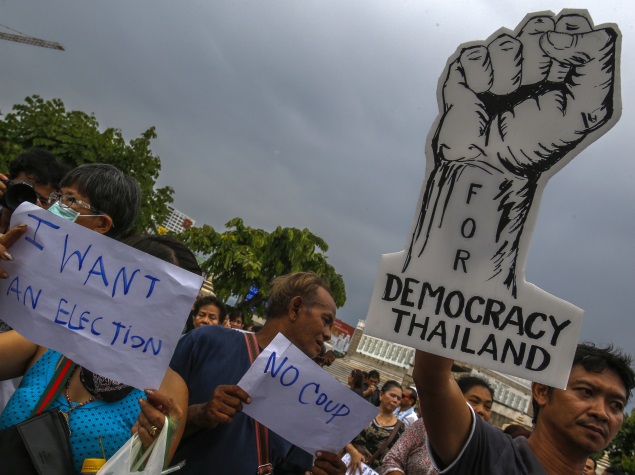- Home
- Social networking
- Social networking News
- Facebook 'Block' Shakes Coup Hit Thailand
Facebook 'Block' Shakes Coup-Hit Thailand

"Urgent: Facebook has been suspended," one user wrote on Twitter.
"Surely that would be suicide. Whole country would protest," wrote another user.
But just minutes later users celebrated: "Facebook is back!!"
The military regime which seized power on May 22 said it had not pulled the plug on the site.
"We have not ordered a block of Facebook it's not our policy," said army spokesman Colonel Winthai Suvaree.
"Facebook experienced a slight technical failure and the Ministry of Information and Communication Technology (ICT) is working to fix it now," he said.
In the sign of the power of social media in the digital era, the junta even interrupted normal television broadcasts to reassure the nation that Facebook was not under siege.
Surachai Srisaracam, permanent secretary at the ICT ministry, said reports quoting him as confirming a Facebook block were "all a misunderstanding".
"The gateway had a problem," he told AFP. "I think it works now."
But some users were unconvinced, speculating that it could have been a trial run for a possible blackout in the future, or a warning shot to social media users not to criticise the coup.
Social media platforms such as Twitter and Facebook are hugely popular in the country, and have been used by anti-coup protesters to organise small protests against the junta.
The military has warned it would block any platforms found to carry content that incites violence, or is critical of its military leaders or the monarchy.
(Also see: Thai Army Warns It Will Block Social Media if Critical Content Is Found)
So far about 330 websites have been taken offline by the junta, according to technology crime suppression officials.
Foreign television news channels such as the BBC and CNN have also been blocked.
Even before the declaration of martial law last week, Thailand faced criticism about its curbs on the media, particularly harsh royal defamation legislation which critics say is used to muzzle political dissent.
In 2010 more than 1,300 websites including Wikileaks were blocked during a protest by "Red Shirts" supporters of former premier Thaksin Shinawatra, whose ousting in a coup eight years ago ignited the protracted political crisis.
Websites like Facebook and Twitter have played a key role in galvanising popular uprisings in the Arab world since 2010 that have resulted in the toppling of longtime autocratic leaders in Tunisia, Libya, Egypt and Yemen.
For the latest tech news and reviews, follow Gadgets 360 on X, Facebook, WhatsApp, Threads and Google News. For the latest videos on gadgets and tech, subscribe to our YouTube channel. If you want to know everything about top influencers, follow our in-house Who'sThat360 on Instagram and YouTube.
Related Stories
- Samsung Galaxy Unpacked 2025
- ChatGPT
- Redmi Note 14 Pro+
- iPhone 16
- Apple Vision Pro
- Oneplus 12
- OnePlus Nord CE 3 Lite 5G
- iPhone 13
- Xiaomi 14 Pro
- Oppo Find N3
- Tecno Spark Go (2023)
- Realme V30
- Best Phones Under 25000
- Samsung Galaxy S24 Series
- Cryptocurrency
- iQoo 12
- Samsung Galaxy S24 Ultra
- Giottus
- Samsung Galaxy Z Flip 5
- Apple 'Scary Fast'
- Housefull 5
- GoPro Hero 12 Black Review
- Invincible Season 2
- JioGlass
- HD Ready TV
- Laptop Under 50000
- Smartwatch Under 10000
- Latest Mobile Phones
- Compare Phones
- Moto G15 Power
- Moto G15
- Realme 14x 5G
- Poco M7 Pro 5G
- Poco C75 5G
- Vivo Y300 (China)
- HMD Arc
- Lava Blaze Duo 5G
- Asus Zenbook S 14
- MacBook Pro 16-inch (M4 Max, 2024)
- Honor Pad V9
- Tecno Megapad 11
- Redmi Watch 5
- Huawei Watch Ultimate Design
- Sony 65 Inches Ultra HD (4K) LED Smart TV (KD-65X74L)
- TCL 55 Inches Ultra HD (4K) LED Smart TV (55C61B)
- Sony PlayStation 5 Pro
- Sony PlayStation 5 Slim Digital Edition
- Blue Star 1.5 Ton 3 Star Inverter Split AC (IC318DNUHC)
- Blue Star 1.5 Ton 3 Star Inverter Split AC (IA318VKU)
















